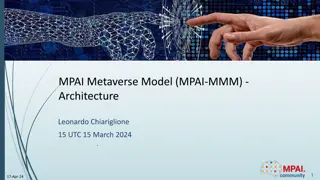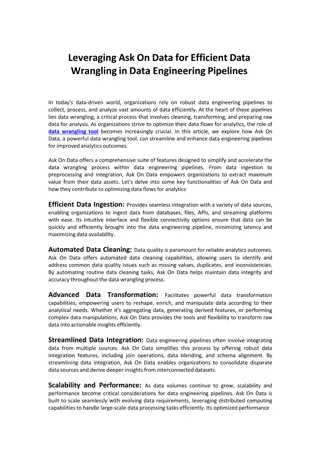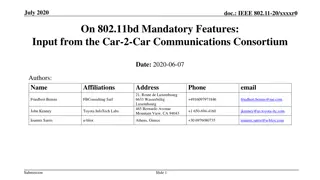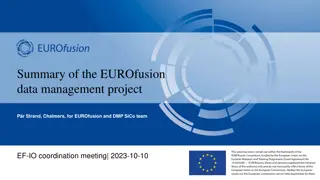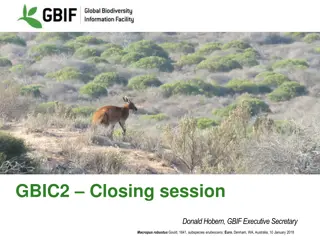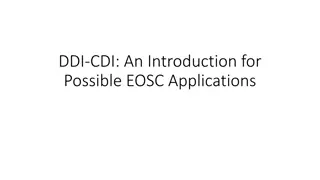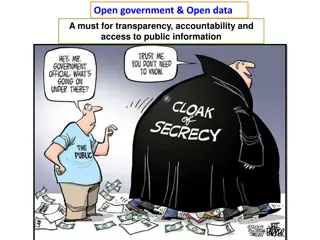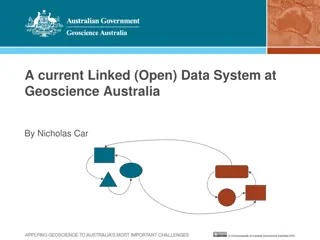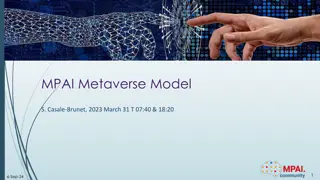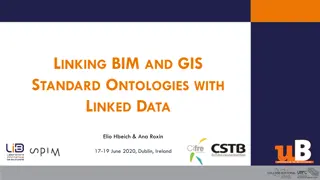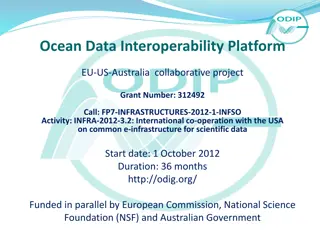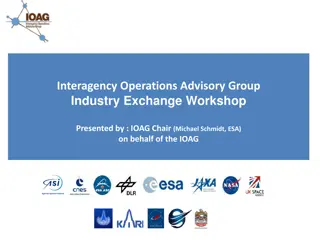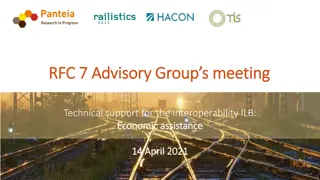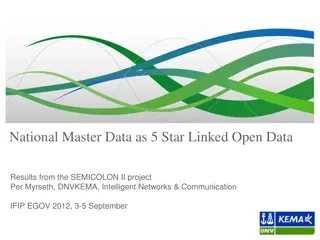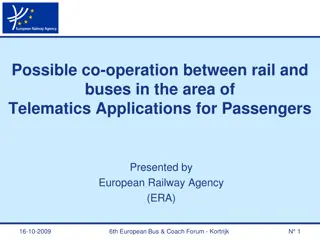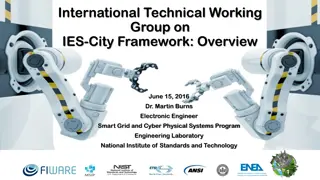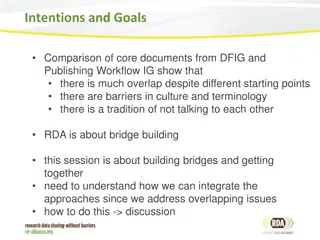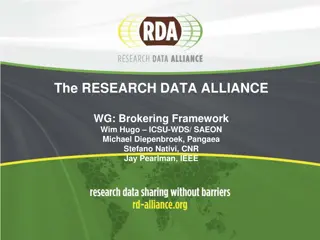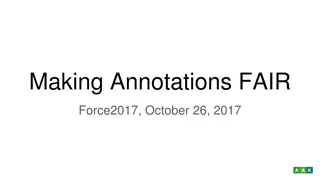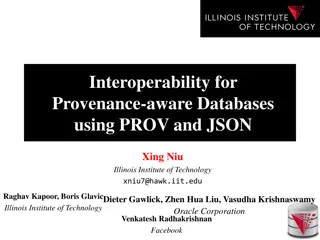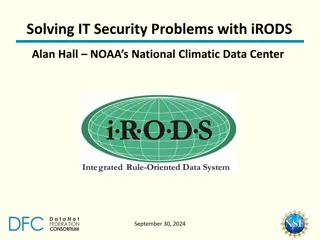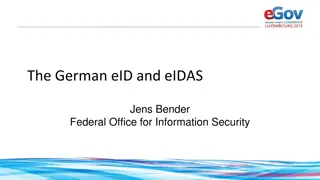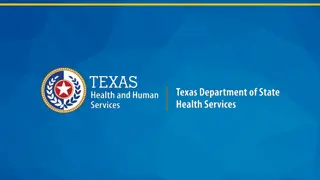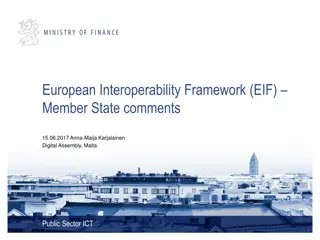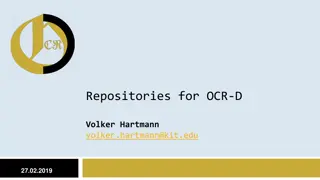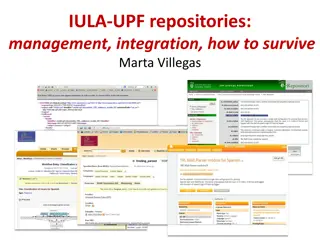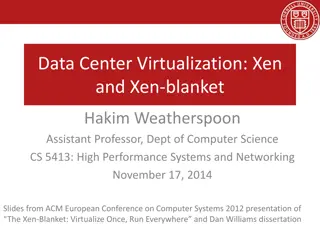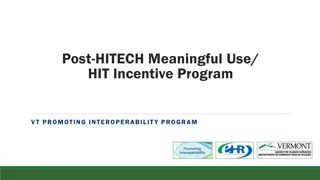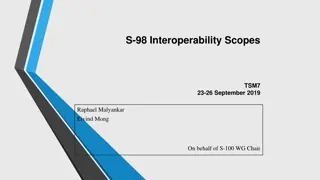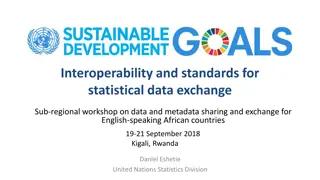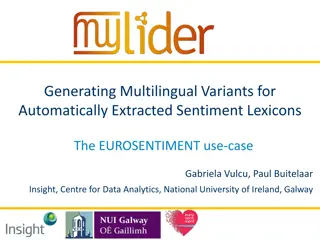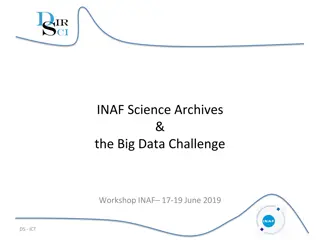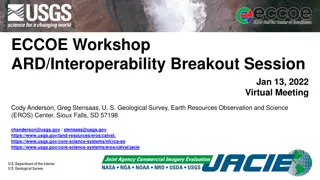Understanding MPAI's Role in Metaverse Interoperability
MPAI, spearheaded by Leonardo Chiariglione, plays a crucial role in defining standards and technologies for the metaverse, ensuring interoperability between different metaverse instances. This involves functional and prescriptive interoperability, enabling seamless data exchange and operation models
3 views • 38 slides
Enhancing Wheat Data Interoperability for Sustainable Production
The wheat research community faces challenges in meeting the increasing demand for wheat production due to a lack of data harmonization and standards. The Wheat Data Interoperability Working Group aims to improve the interoperability of wheat-related data through shared guidelines, tools, and recomm
4 views • 10 slides
Ask On Data for Efficient Data Wrangling in Data Engineering
In today's data-driven world, organizations rely on robust data engineering pipelines to collect, process, and analyze vast amounts of data efficiently. At the heart of these pipelines lies data wrangling, a critical process that involves cleaning, transforming, and preparing raw data for analysis.
2 views • 2 slides
Proposal for New 802.11bd 20MHz Mode for Enhanced ITS Interoperability
The document discusses the necessity of a new 802.11bd 20MHz mode for improved interoperability within Intelligent Transportation Systems (ITS) due to limitations with current Wi-Fi channels and the scope of 256-QAM modulation. It presents proposals approved by the Car-2-Car Communications Consortiu
0 views • 8 slides
The Impact of Interoperability in Education
Explore the significance of interoperability in education through insightful statistics and data. Learn how improved interoperability can benefit CTOs, teachers, and schools. Discover the challenges and potential solutions related to the seamless sharing of data and digital tools in educational sett
0 views • 30 slides
EUROfusion Data Management Project Summary
EUROfusion data management project led by P. Strand at Chalmers outlines a comprehensive data management plan with four scenarios of increasing ambition, from making metadata available to open access for non-embargoed data. The plan includes strategies for interoperability, data accessibility, enhan
0 views • 11 slides
Shared Challenges in Biodiversity Informatics Collaboration
The Coalition of Open Biodiversity Infrastructures and Networks aims to enhance collaboration for comprehensive biodiversity data management and accessibility. They focus on delivering biodiversity knowledge effectively, enabling stakeholder participation, promoting open data sharing, mobilizing his
2 views • 13 slides
Data Documentation Initiative (DDI) for Enhanced EOSC Applications
Introduction to DDI-CDI and its relevance in EOSC applications, highlighting examples, foundational metadata, possible applications, questions for consideration, interoperability with FAIR data principles, and challenges in research across domain boundaries. DDI standards aim to improve data documen
0 views • 51 slides
Open Government Data and Sustainable Development Goals
Open government data and sustainable development goals go hand in hand, promoting transparency, accountability, and access to public information. Openness in data allows for universal participation, interoperability, and value creation. By striving for sustainable development and embracing open gove
2 views • 24 slides
Introduction to Linked Data in Geoscience Australia
Linked Data is a publishing paradigm that elevates both web pages and data to first-class citizens of the Web, enabling a global data space evolution. This concept, as explored in Geoscience Australia, involves the utilization of Semantic Web standards to promote common data formats and exchange pro
1 views • 23 slides
The Road to Metaverse Interoperability: Challenges and Solutions
Metaverse standards and interoperability are crucial for unleashing the full potential of this transformative technology. However, the lack of common agreement on what a metaverse entails poses challenges. The MPAI roadmap addresses key steps towards achieving interoperability, including developing
0 views • 17 slides
OpenFMB Framework: Empowering Utility Interoperability
Open Field Message Bus (OpenFMB) is a framework and reference architecture designed to enable interoperability for Distributed Intelligence Applications, focusing on cybersecurity, microgrids, Distributed Energy Resources (DER), and more. It provides a standard API for Electric Grid interoperability
0 views • 16 slides
Understanding XTCE and SEDS in Mission Operations
XTCE (XML Telemetric and Command Exchange) and SEDS (Space Experiments Data System) are essential tools in mission operations. XTCE serves as a standard database language for telemetry and commanding, while SEDS provides a platform for managing space experiment data. These tools are related through
1 views • 13 slides
Term Overlap Among Matportal Ontologies
The study focuses on term overlap among 5 Matportal ontologies, assessing interoperability and semantic ambiguity. Results show high rates of URI matches between specific ontologies, with discussions on the implications and potential solutions for enhancing interoperability.
0 views • 7 slides
Linking BIM and GIS Standard Ontologies with Linked Data
Introduction to the need for seamless data interpretation between Building Information Model (BIM) and Geographic Information System (GIS), focusing on aligning BIM and GIS standard ontologies for semantic interoperability. Addressing the challenges of data interoperability layers and the characteri
0 views • 15 slides
Ocean Data Interoperability Platform: EU-US-Australia Collaborative Project
This collaborative project, funded by the European Commission, National Science Foundation (NSF), and Australian Government, aims to develop a collaboration platform for organized dialogue between partners from Europe, the USA, and Australia. The project focuses on establishing a coordination platfo
0 views • 9 slides
Interagency Operations Advisory Group Industry Exchange Workshop Summary
The Interagency Operations Advisory Group (IOAG) facilitates collaboration among international agencies for space communications policy, procedures, and technical interfaces to ensure safe, secure, and efficient mission operations. It aims to enhance interoperability, network responsiveness, and thr
0 views • 30 slides
Analysis of Economic Assistance and Impacts on Interoperability at RFC-7 Advisory Group's Meeting
Overview of the RFC-7 Advisory Group's meeting discussing technical support for interoperability and economic assistance through the CBA methodology. The results from three case studies and the identification of remaining issues are presented, highlighting the direct and indirect impacts of solving
0 views • 6 slides
Improving Interoperability with Linked Open Data in the SEMICOLON II Project
The SEMICOLON II project aimed to enhance eGov solutions by utilizing Linked Open Data principles to open up public registers and create semantic technologies. The project spanned from 2007 to 2013 with a budget of approximately $15 million, focusing on core national master data maintenance and moti
0 views • 25 slides
European Railway Agency's Role in Promoting Cooperation between Rail and Buses in Telematics Applications
The European Railway Agency (ERA) plays a crucial role in enhancing cooperation between rail and buses through Telematics Applications. Established in 2004, ERA focuses on recommending legislation, ensuring interoperability, and enhancing safety in the European rail network. Recommendations made by
0 views • 17 slides
Advancing Smart Cities: IES-City Framework Overview
The International Technical Working Group on IES-City Framework, led by Dr. Martin Burns, is developing a reference framework for IoT-enabled Smart City technologies to streamline architectural designs and enhance interoperability. The group aims to create a common set of features for Smart Cities,
0 views • 74 slides
Building Bridges and Integrating Approaches in Research for Efficiency and Interoperability
Despite different starting points, there is significant overlap in the core documents of DFIG and Publishing Workflow IG. The session focuses on integrating approaches to address overlapping issues, with an emphasis on building bridges between diverse research cultures and terminology barriers. Key
0 views • 16 slides
Enhancing Data Brokering Framework in Research Data Alliance
The Research Data Alliance Working Group focuses on developing a Brokering Framework to improve data publication, discovery, and mediation across various disciplines. The group aims to address challenges related to diverse service protocols, content standards, and brokering technologies. Their visio
0 views • 18 slides
The FAIR Principles for Data Management and Stewardship
Embrace the FAIR principles - Findable, Accessible, Interoperable, Re-usable - for effective scientific data management and stewardship. Learn how annotations enhance data FAIRness and the key attributes of each principle. Dive into the high-level guiding principles that ensure data is globally uniq
0 views • 25 slides
Interoperability for Provenance-aware Databases Using PROV and JSON
This research paper discusses the challenges in tracking database provenance and proposes a system, GProM, that computes provenance for database operations. It highlights the importance of exchanging provenance information between systems and the limitations of current relational database systems in
0 views • 28 slides
Solving IT Security Problems with iRODS at NOAA's National Climatic Data Center
The NOAA DFC Interoperability initiative aims to deposit climate data records securely by utilizing iRODS data grids. The integration of iRODS systems between OOI and NCDC simplifies data ingestion, provided security requirements are met. The setup includes iRODS Secure Ingest in the DMZ landing zon
0 views • 6 slides
German eID and eIDAS: Secure Digital Identification Overview
The German eID system, including eIDAS integration, offers secure digital identification services through government-issued ID cards with embedded chips. It allows citizens and service providers to authenticate each other securely online. The system emphasizes interoperability and privacy protection
0 views • 16 slides
Update on Health Information Technology & Policy Committee Insights
The update on health information technology covers recent developments in federal actions related to healthcare reimbursement rates and interoperability rules. Changes in the Medicare Inpatient Prospective Payment System and Hospital Promoting Interoperability Rule impact hospitals, requiring partic
0 views • 12 slides
European Interoperability Framework (EIF) Member State Comments by Anna-Maija Karjalainen
Anna-Maija Karjalainen, Director General of Public Sector ICT in Finland, shares insights on the European Interoperability Framework (EIF) and Finland's progress towards interoperable digital services. The EIF aims to enhance the delivery of public services across Europe, promoting open data, semant
0 views • 5 slides
Managing Research Data Repositories for OCR-D
Research data repositories play a crucial role in the OCR-D framework, storing and managing data from document analysis processes. These repositories, like the Ground Truth (GT) repository, support FAIR principles by organizing findable, accessible, and retrievable data with metadata and provenance
0 views • 11 slides
Challenges in Integrating Different Repositories for Metadata Interoperability
Addressing the integration of repositories with varying schemas and protocols such as OAI-PMH and APIs is crucial for ensuring metadata interoperability. The key requirements include maintaining data integrity through a centralized editing point, leveraging automatic import/export mechanisms, and ad
0 views • 8 slides
Xen-Blanket: Virtualize Once, Run Everywhere
The Xen-Blanket, introduced by Hakim Weatherspoon, aims to address challenges in cloud computing such as lack of interoperability and efficient resource utilization. It enables uniform VM images, advanced hypervisor management, and seamless migration between clouds. The second-layer hypervisor enhan
0 views • 28 slides
Vermont Promoting Interoperability Program Overview
The Vermont Promoting Interoperability Program, formerly known as the Electronic Health Record Incentive Payment program, incentivizes Medicaid providers to adopt, implement, and meaningfully use electronic health records. This program, funded mostly by federal dollars, aims to improve interoperabil
0 views • 16 slides
Meeting Summary: Interoperability and Gas Quality in Gas Regional Initiative
Discussion highlights from the 38th IG Meeting of the South Gas Regional Initiative teleconference held on July 18, 2016. Focus on interoperability, latest developments, and next steps in the region. Key topics include Interconnection Agreement requirements, gas flow control, gas quantity allocation
0 views • 24 slides
S-98 Interoperability Scopes Overview
This paper discusses options for defining interoperability scopes, restructuring the draft S-98 interoperability specification, and assessing the implications of implementing different levels of interoperability. It suggests a phased introduction with pauses for evaluation, focusing on lower complex
0 views • 8 slides
Enhancing Statistical Data Exchange and Interoperability in African Countries
Sub-regional workshop in Kigali focused on the challenges and importance of modernizing statistical data exchange and dissemination in African countries. The Cape Town Global Action Plan emphasizes the need for innovation and modernization of national statistical systems, including the development o
0 views • 17 slides
Multilingual Sentiment Analysis for Enhanced Language Resources
This presentation discusses the EUROSENTIMENT project focusing on generating multilingual variants for sentiment lexicons. Addressing challenges in sentiment analysis, the project aims to build a shared language resource pool to improve adaptability and interoperability of language resources. Object
0 views • 36 slides
INAF Science Archives & the Big Data Challenge Workshop Summary
This workshop held in INAF, Italy, focused on the interaction between Computing Science and Astrophysics. Key points included data curation, openness, use cases, status of current and future archives, and expertise networking. The discussion highlighted terms like Open Science, FAIR principles, Inte
0 views • 7 slides
Enhancing COVID-19 Data Integration and Comparison with GeoCOVID Watch
This initiative, supported by the European Commission, focuses on addressing the challenges of data interoperability in COVID-19-related datasets. By leveraging geospatial data and cutting-edge technologies, the project aims to improve the understanding of the pandemic's impacts through standardized
0 views • 13 slides
JACIE ECCOE Workshop on ARD Interoperability Breakout Session Summary
JACIE ECCOE workshop held a breakout session on ARD interoperability covering topics such as calibration, data quality, accuracy, traceable uncertainty, geospatial workflows, governance, and leadership. Various experts led the breakout groups to discuss key questions and actions for improving data q
0 views • 7 slides
